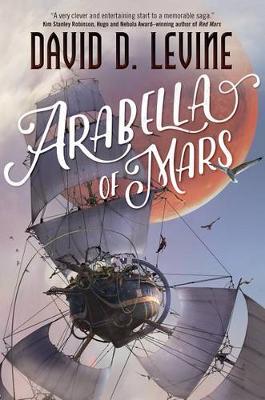Arabella was born and raised on a plantation on Mars. Her mother is from England and wants to take her daughters back to have them raised as proper ladies. When Arabella's father dies, she seizes the opportunity and takes them back to England, leaving Arabella's brother in charge of the plantation.
Back on Earth, Arabella doesn't fit in. When a nasty cousin realizes that he will be heir to the plantation if her brother dies, he jumps on an airship to Mars to kill him. Arabella realizes that she needs to get to Mars first to warn her brother.
This book felt a lot more like a sea-going novel like Horatio Hornblower than a space-traveling sci fi book.
The ships that travel to and from Mars are basically British naval vessels of the sailing era fitted with balloons. Arabella disguises herself as a boy and gets a job on a ship. Most of the book takes place on the ship on the way to Mars with aerial battles and possible strandings and mutinies.
I was interested to see how this wooden ship was going to be made able to withstand the rigors of space. Were the balloons going to wrap around it and seal the ship? Nope. In this world science is different.
- There is air in space so you don't need oxygen.
- There is wind in space to move the ship using the sails.
- It isn't cold. You can wander about in normal clothes.
- There's no vacuum so you don't explode.
- The only thing different on Mars is lighter gravity.
Social issues discussed
- The role of women in society
- The captain of the ship Arabella works on is Indian and that doesn't sit well with several of the white crewmembers
- There are native inhabitants of Mars who the English treat as servants as they were wont to do when colonizing places. The Martians are not pleased with this.
First come first served and if you want to throw in a few dollars for shipping that would be great but not required.
This review was originally posted on Based On A True Story
